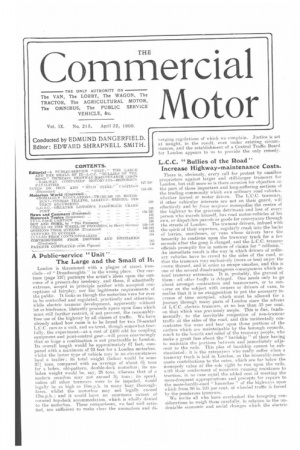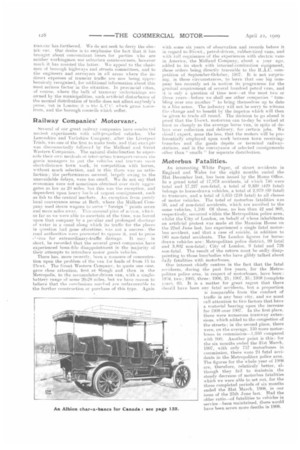L.C.C. "Bullies of the Road" Increase Highway-maintenance Costs.
Page 1

Page 2

If you've noticed an error in this article please click here to report it so we can fix it.
There is, obviously, every call for protest by omnibus proprietors against larger and still-larger tramcars for London, but still more so is there occasion for objection on the part of those important and long-suffering sections of the trading community which own ordinary road vehicles, whether horsed or motor driven. The L.C.C. tramcars, if other vehicular interests are not on their guard, will effectively and by force majeure monopolise the centre of the highway to the grievous detriment and loss of every person who travels himself, has road motor-vehicles of his own, or dispatches parcels or goods for conveyance through the streets of London. The tramcar drivers, imbued with the spirit of their superiors, regularly crash into the hacks of lorries, omnibuses, or vans whose drivers have the temerity to continue upon the tramway track for a few seconds after the gong is clanged, and the L.C.C. tramcar officials promptly fire in notices of claims for " collision." An immediate result is the way in which drivers of ordinary vehicles have to crowd to the sides of the road, so that the tramcars may exclusively (more or less) enjoy the crown thereof, and in order to escape smashes, and this is one of the several disadvantageous consequences which attend tramway extension. It is, probably, the gravest of them : all other traffic is delayed. One needs only to go about amongst contractors and teamowners, or to con% erse on the subject with owners or drivers of vans, to realise that it is no exaggeration to put the necessary increase of time occupied, which must be allowed for a journey through many parts of London since the advent of L.C.C. electric tramcars., at no less than 50 per cent. on -that which was previously ample. This is due, fundamentally, to the inevitable congestion of non-tramcar traffic at the sides of the road, and this incidentally concentrates the wear and tear upon those portions of the surface %Odell are maintainable by the borough councils, much to the benefit and relief of the tramway people, who make a great fuss about the " hardship " of their having to maintain the portions between and immediately adjaeent to the rails. This plea of hardship cannot be substantiated ; it is the ratepayers who really stiffer when a tramway track is laid in London, as the miserably-inadequate contributions to the rates, which are far below the monopoly value of the sole right to run upon the rails, with their conferment of minimmn running resistance to traction, in no ease equal the added cost of meeting the more-frequent appropriations and precepts for repairs to the more-hardly-used " haunches " of the highways upon hich from 90 to 100 per cent, of wheeled traffic! is forced by the ponderous tramcars. We invite all who have overlooked the foregoing considerations to weigh them carefully, in relation to the undeniable economic and social changes which the electric
tramcar has furthered. We do not seek to decry the electric ear. Our desire is to emphasise the fact that it has brought about concomitant losses for parties who are neither workingmen nor suburban estate-owners, however much it has assisted the latter. We appeal to the chairmen of borough highways and streets committees, and to the engineers and surveyors in all areas where the indirect expenses of tramcar traffic are now being apprehensively recognised, for additional information about this most serious factor iu the situation. In provincial of course, where the bulk of tramway undertakings are owned by the municipalities, such artificial disturbance of the normal distribution of traffic does not affect anybody's
purse, hut in 1,0116011 it IS the l t 4 which gains tderefrom, and the borough councils which suffer.




















